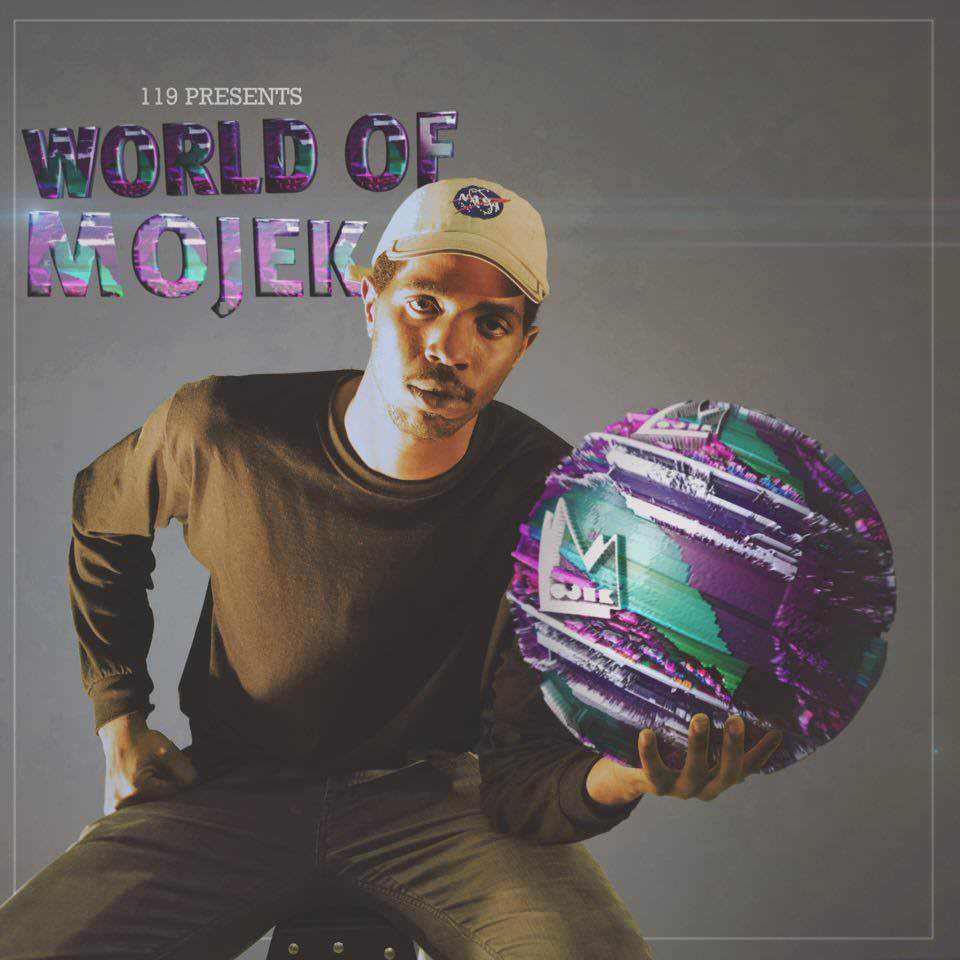It’s somewhat indicative of the hyperconnected state of the Chicago music scene that the best tapes and albums to come out of the city in the lasWt few years have been collaborative in nature. Projects like Acid Rap, Surf, Towkio’s .Wav Theory, and Mick Jenkins The Water[s] were not just bold statements from emerging Chicago artists, but also keys to unlocking the networks of local talent. Key features from Noname Gypsy, Saba, Jean Deaux, and others helped to make those albums feel dynamic and unpredictable, even as the guest artists received underlying direction from the artist heading the projects. World of Mojek, the newest tape from rising DJ and producer Mojek, released through Chicago collective 119 Productions, follows in this pattern, albeit on a less grand scale. Mojek brings together some of the most underrated local talents for a seven-track tape that expands and highlights his talent as an arranger and collaborator.
As a producer and not a rapper, Mojek leaves a lighter footprint on his project than a Chance or a Mick Jenkins might. Rather than express his worldview outright, he lets the sounds of the tape do the work for him, creating a space that’s danceable, synthesized, and even a little retro-futurist, but still human. Much of the action takes place in the rhythm section: for every straightforward hip-hop beat, there’s a stop-and-start stutter rhythm like the one on “Dally’s Break.”
The beat splits the difference with the snakelike melody, giving Savemoney up-and-comer Dally Auston a challenge for his flow. Jean Deaux makes an appearance in “Pop the Gun,” letting her signature drawl run over the song’s bass line. The best of these hip-hop showcases, though, is Angelenah (formerly Angel Davanport) on “Push the Limit.” She obliterates the cloud of synthesizers in the production with her self-aware, self-deprecating, and most of all self-empowering verses. As always, Angelenah plays the split between songstress and rapper well, keeping both her singing and her rapping casual, even offhand, but never lacking forcefulness. Mojek mostly keeps his hands off these hip-hop tracks, setting the stage for his collaborators and giving them an environment in which to thrive.
But Mojek’s collaborative spirit doesn’t keep him from making the project undeniably his. In songs like “Jheri Curl” and his single with Ric Wilson, “The World,” the producer’s dance bona fides emerge, showing someone who knows where the crowd is going and wants to guide them there. On “The World” especially, Mojek takes what mostly seems like detritus at first glance—a tiny sampled voice here, a Daft Punk-derived bassline there, the auto-tuned Wilson threaded throughout—and assembles it into an irresistible house tune with a slight futurist bent. The best songs on the tape take that smoothness and run with it: “Jheri Curl” throws in just enough of an R&B sample to keep listeners satisfied, even as the beat gets more and more frantic beneath. If there’s one thing that unifies these songs, it’s their ability to distract you from just how smartly arranged they are.
World of Mojek is a departure from Mojek’s previous work, which had its roots in footwork, but this new tape still pays its dues to that original sound. Mojek has opened for Teklife DJs on multiple occasions, but as this project makes clear, he’s more comfortable blazing his own path.
“I just don’t really like to ride coattails, you know?” he said in an interview with the Weekly. “I’d rather do my own thing.”
Besides, the fit isn’t quite there. While a lot of footwork makes its name off of musically intimidating beats and a hip image, associated with all-black streetwear and the like, Mojek comes to his audience with open arms, aiming to please but also to serve as a guide. It’s an attitude that’s becoming increasingly valid in hip-hop and dance—a guarded positivity that hopes for the best even when things don’t always work out. “The World” especially feels mantra-like, insistent in its repetition of “Baby can’t nobody stop us/ We’ve got the world in our pocket.” Mojek isn’t aiming for the cheap seats, to be sure, but he keeps in mind the breadth of people he wants to hear his music.
Knowing that, maybe the most telling association isn’t Mojek’s ties to footwork, but instead his growing interest in world music. Mojek holds a lot of ties to the world at large, and he’s never too far from keeping that in mind: his family has ties to the family of Fela Kuti, and he’s always keeping an eye on electronic music derived from African rhythms, like South African kwaito and Portuguese kuduro/techno group Buraka Som Sistema. Even while talking about popular Chicago club The Shrine, Mojek points out a lesser-known fact: The Shrine’s namesake is the New Africa Shrine, in Lagos, Nigeria, a venue Mojek hopes to play one day.
Thinking about Mojek in those broader contexts help everything—the collaborative spirit, the polyrhythms, the upbeat attitude—fall into place. It’s not hard to think of the “world of Mojek” being Chicago—the rap scene, the footwork, the collectives—but if Mojek keeps making the music he’s making with the ambitions he has, that world just might turn out to be a lot larger than any of us imagined.


Nice. Thank you so much
Pamela Mojekwu
THANK YOU SO MUCH…I am just a PROUD mom!!